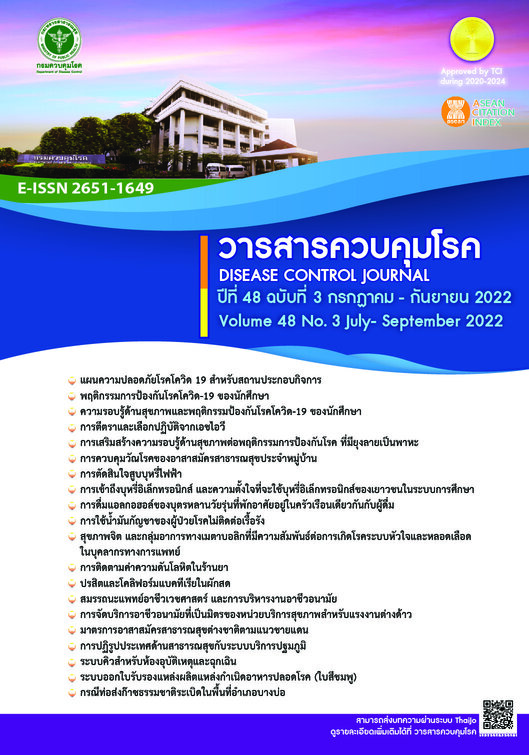Assessment of the International Health Volunteer Measures on Disease Prevention and Control along Thai Border with Myanmar, LAOs, and Cambodia
DOI:
https://doi.org/10.14456/dcj.2022.55Keywords:
Evaluation, International Health Volunteers (IHVs), BorderAbstract
Although Thailand has healthcare system and tools for work internationally to prevent disease, problems with infectious diseases and cross border healthcare system still have been persisted. The International Health Volunteers (IHVs) measure is a tool that established for facilitating an access to health services of foreign population. This study aimed to evaluate the IHVs measure regarding the promotion of health service access and to explain the barriers to IHVs measure during 2017-2018. Quantitative data were collected by questionnaires and qualitative data were collected by interview. This study defined 2 key result areas (KRA) and 4 key performance indexes (KPI). The area of this study located in 3 border areas of Thailand as follows: 1) Thailand-Laos border in Sirindhorn district, Ubon Ratchathani province and Si Chiang Mai district, Nong Khai province; 2) Thailand-Cambodia border in Khok Sung district, Sakaeo Province and Khlong yai district, Trat province; and 3) Thailand-Myanmar border in Mueang district, Ranong province and Mae sot district, Tak province. Quantitative data were analyzed by descriptive statistics such as frequency, percentage, standard deviation whereas qualitative data were analyzed by using content analysis. The results found that the overall implementation score of the measure was higher than the target value (x̄ =2.28, full score 3.0), indicating that IHVs measures have the potential to promote migrant workers' access to health services. Obstacles encountered the implementation of the measure are as follows: 1) Migration after the development and distribution of the foreign population; 2) Most IHVs can communicate in Thai but neither can read nor write in Thai, as well as, being an IHVs leads to decrease their income; 3) No incentives such as health benefits, compensation, citizenship registration, and employer support. 4) The training courses for IHVs are complicated and time consuming. 5) There is no continuous IHVs policy. 6) IHVs in some areas are illegal workers.
Downloads
References
Office of the Permanent Secretary Ministry of Public Health (TH). Public health action plan for Support special economic development zones. Nonthaburi: Office of the Permanent Secretary Ministry of Public Health; 2016. (in Thai)
Huguet JW, editors. Thailand migration report 2014. Bangkok: Tammadapress; 2014.
Srithongtham O, Songpracha S, Sanguanwongwan W, Charoenmukayananta S. The impact of trans-national migrant from Burma, Laos, and Cambodia to the burden of health care service of the community hospital at border area of Thailand. Ubon Ratchathani: Office of Disease Prevention and Control, Region 10 Ubon Ratchathani; 2013. (in Thai)
Suteerawut T, Haruthai C, Thanaisawanyangkoon S, Panjangampatthana A, editors. Training Curriculum for Migrant Health Volunteers (MHVs). Bangkok: Nursing office Ministry of Public Health; 2015. (in Thai)
Phatininnat C, Jaiwithee W, Arayawong W, editors. Standard training course for migrant public health volunteers. Bangkok: Department of Health Service Support Ministry of Health; 2014. (in Thai)
Mitthong W. Access to health care services for Myanmar migrant workers at Samutsakhon Hospital [thesis]. Bangkok: Thammasat University; 2017. (in Thai)
Fathima FN, Raju M, Varadharajan KS, Krishnamurthy A, Ananthkumar SR, Mony PK. Assessment of ‘Accredited Social Health Activists’—A National Community Health Volunteer Scheme in Karnataka State, India. J Health Popul Nutr. 2015;33(1):137-45.
Chung MHL, Hazmi H, Lian CW. Role Performance of Community Health Volunteers and Its Associated Factors in Kuching District, Sarawak. Journal of Environmental and Public Health. 2017 Feb:1-9.
Sootthasil M, Sasang N, Chusak T. Factors Influencing Participation in Managing to Control and Prevention the Spread of Contagious Disease: The Border Area of the Village Public Health Volunteer in Phusang District Phayao Province. Journal of The Royal Thai Army Nurses. 2017;18(1):83-93.
Reamrimmadun Y, Kumsri S. Factors Related to Health Promotion Behavior by Foreign Workers in Chachoengsao Province. HCU Journal of Health Science. 2018;21(42):79-91.
Wayne W. Biostatistics: A foundation of analysis in the health sciences (6thed). New York: John Wiley & Sons; 1995.
Ngamjarus C, Chongsuvivatwong V. n4Studies: Sample Size Calculation for an Epidemiological Study on a Smart Device. Siriraj Medical Journal. 2016;68(3):160-170.
Best JW. Research in Education. 4th ed. Englewood cliff: Prentice Hall; 1981.
Downloads
Published
How to Cite
Issue
Section
License
Copyright (c) 2022 Disease Control Journal

This work is licensed under a Creative Commons Attribution-NonCommercial-NoDerivatives 4.0 International License.
Articles published in the Disease Control Journal are considered as academic work, research or analysis of the personal opinion of the authors, not the opinion of the Thailand Department of Disease Control or editorial team. The authors must be responsible for their articles.






